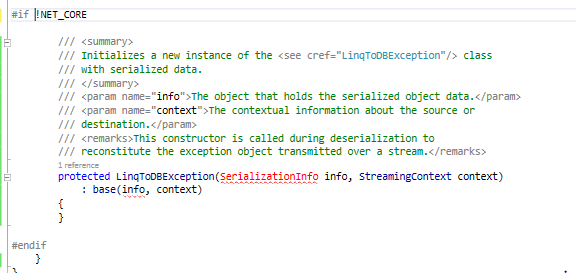I have created a .NET Core R2 class library and have some common code that I use for several different platforms.
Some of the code is not valid in the .NET Core platform and so I wish to wrap it around a conditional compilation symbol. I first searched the Internet to see if I could find a built-in symbol (like SILVERLIGHT for Silverlight applications and WINFX_CORE for Windows 8 applications), but I was not able to find any information, so I decided to create my own symbol. This also does not seem to work.
From everything I read, adding and using a symbol should be easy. Just add a value to the conditional compilation symbols in the project properties → Build tab. I did that, but it does not seem to work. Here are a couple of screenshots...
Notice that I added a NET_CORE value in the conditional compilation symbol, but when I use it in code the code is not being ignored.
Is there is a built-in symbol for the .NET Core platform (I am using R2)?
If there is not one, what am I doing wrong creating my own symbol?
The .xproj file:
<?xml version="1.0" encoding="utf-8"?>
<Project ToolsVersion="14.0" DefaultTargets="Build" xmlns="http://schemas.microsoft.com/developer/msbuild/2003">
<PropertyGroup>
<VisualStudioVersion Condition="'$(VisualStudioVersion)' == ''">14.0</VisualStudioVersion>
<VSToolsPath Condition="'$(VSToolsPath)' == ''">$(MSBuildExtensionsPath32)\Microsoft\VisualStudio\v$(VisualStudioVersion)</VSToolsPath>
</PropertyGroup>
<Import Project="$(VSToolsPath)\DotNet\Microsoft.DotNet.Props" Condition="'$(VSToolsPath)' != ''" />
<PropertyGroup Label="Globals">
<ProjectGuid>253184d7-9b42-4233-a871-8cfa3ee9e83e</ProjectGuid>
<RootNamespace>Linq2Db.NetCore</RootNamespace>
<BaseIntermediateOutputPath Condition="'$(BaseIntermediateOutputPath)'=='' ">.\obj</BaseIntermediateOutputPath>
<OutputPath Condition="'$(OutputPath)'=='' ">.\bin\</OutputPath>
<TargetFrameworkVersion>v4.6.1</TargetFrameworkVersion>
<SccProjectName>SAK</SccProjectName>
<SccProvider>SAK</SccProvider>
<SccAuxPath>SAK</SccAuxPath>
<SccLocalPath>SAK</SccLocalPath>
</PropertyGroup>
<PropertyGroup>
<SchemaVersion>2.0</SchemaVersion>
</PropertyGroup>
<Import Project="$(VSToolsPath)\DotNet\Microsoft.DotNet.targets" Condition="'$(VSToolsPath)' != ''" />
</Project>
UPDATE: I was able to resolve this using the link in the provided answer. Here are the details...
Originally the project.json file looked like this...
{
"dependencies": {
"NETStandard.Library": "1.5.0-rc2-24027"
},
"frameworks": {
"netstandard1.5": {
"imports": "dnxcore50"
}
},
"buildOptions": {
"defines": [ "NET_CORE" ]
}
}
I resolved the issue by changing it to this...
{
"frameworks": {
"netstandard1.5": {
"imports": "dnxcore50",
"dependencies": {
"NETStandard.Library": "1.5.0-rc2-24027"
},
"buildOptions": {
"define": [ "NET_CORE" ]
}
}
}
}


